Farmhouses in the UAE: Trends and Insights
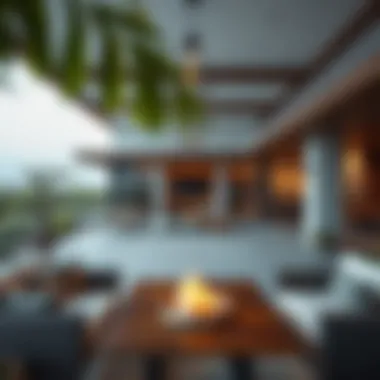
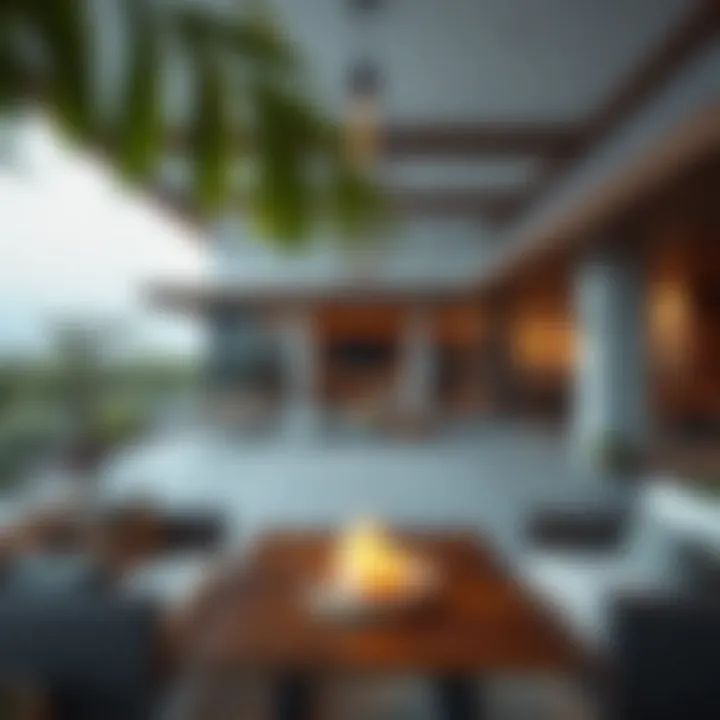
Intro
The concept of farmhouses in the UAE is not merely a reflection of an architectural trend; it's a vivid response to the evolving lifestyle preferences of residents and expatriates alike. Over the years, as the urban landscape burgeoned, many sought refuge from the hustle and bustle of city life, making the allure of spacious, serene farmhouses irresistible. Nestled between the luxurious infrastructure and the arid desert, these homesteads offer a unique fusion of traditional and contemporary living—appealing greatly to those wishing to connect with nature without sacrificing comfort.
In this article, we'll explore the fabric that binds these farmhouses to the unique socio-economic environment of the Gulf region. What styles dominate the scene? What drives the investments and market dynamics surrounding these properties? Through our examination, we aim to equip both real estate enthusiasts and prospective buyers with a rounded view on the subject, consolidating insights that extend beyond mere aesthetics.
Let’s delve into the current market trends, so you can grasp the changing tides of this niche segment.
The Emergence of Farmhouses in the UAE
The concept of farmhouses in the UAE has evolved into a noteworthy phenomenon that reflects broader social and economic trends within the region. From being merely a place for rest and recreation, these farmhouses have become symbols of a lifestyle that balances luxury with nature, catering to both Emiratis and expatriates seeking refuge from the hustle and bustle of urban existence. As cities like Dubai and Abu Dhabi swell with development, there is a growing desire for open, green spaces, which farmhouses uniquely offer.
As more people show interest in cultivating their own food or simply enjoying serene landscapes, this demand is reshaping not just the real estate market but also the fabric of UAE society. The emergence of farmhouses signifies an important shift towards sustainability and a return to community values. This article aims to dissect and analyze the various layers of this trend, outlining its implications for investors, buyers, agents, and developers alike.
Historical Context
To truly appreciate the status quo, it is important to look back at the historical significance of farmhouses in the UAE. Traditionally, agriculture played a crucial role in the lives of local communities, as fertile oases served as the breadbasket in an otherwise arid environment. In days gone by, these farmhouses were not just farms but also social hubs, where families would gather, celebrate, and share in the harvest.
In the late 20th century, oil discoveries dramatically transformed the UAE landscape, shifting the focus to urbanization and modernization. With rapid development, the number of farms decreased, and many of the remaining structures fell into disrepair. It wasn’t until the early 21st century that a renewed interest in agrarian lifestyles began to resurface, driven by a younger generation eager to reconnect with the land and its history. Investors recognized the potential of reviving these spaces, leading to a modern renaissance of the farmhouse concept.
Modern Developments
The modern landscape of farmhouses in the UAE is a mélange of traditional roots and cutting-edge innovation. Today, many new projects focus on sustainable development aimed at creating eco-friendly farmhouses that harmonize with their surroundings. Advanced building materials and technologies are utilized to minimize the environmental footprint, while still accommodating a luxurious lifestyle.
Additionally, the rise of wellness trends has noteworthy implications. Many buyers are inclined to consider farmhouses as retreat destinations, providing not just a home but a sanctuary away from city life. This has triggered a surge in amenities designed for leisure and relaxation – such as infinity pools, organic gardens, and spaces for various outdoor activities. Moreover, the integration of smart technology into farmhouse design, such as automated irrigation or eco-smart energy systems, attracts a tech-savvy demographic eager for modern conveniences blended with rural charm.
"These structures represent not just a return to the land but signify a lifestyle choice that values sustainability and tranquility."
Defining Characteristics of UAE Farmhouses
Farmhouses in the UAE carry a distinct identity, marrying functionality with aesthetic appeal. These properties not only serve as residences but also embody a way of life that celebrates the natural environment and agricultural heritage of the region. In this section, we delve into the defining characteristics that make these farmhouses sought-after investments.
Key Elements:
- Architectural styles that reflect both tradition and modernity
- Spaces designed for both leisure and productivity
- Integration with the natural landscape, enhancing beauty and sustainability
Architectural Styles
Traditional Arab Style
The Traditional Arab Style of farmhouse architecture is a spectacle. Rooted in centuries-old design principles, this approach often features thick walls, arched doorways, and beautifully adorned ceilings. One key characteristic is the use of local materials, like limestone and clay, which helps buildings blend into their surroundings. This style is not just popular; it's a beneficial choice for buyers seeking authenticity and cultural connection.
One unique feature of Traditional Arab Style is the open courtyard, often seen at the center of the house, allowing natural light and air to flow through. This design promotes a community atmosphere, which can be advantageous for families looking to share space and moments.
However, the primary drawback might be the limited modern amenities, which could deter some prospective buyers aiming for a more contemporary living experience.
Contemporary Designs
Contemporary farmhouse designs offer a breath of fresh air, often characterized by open-plan living spaces and energy-efficient technologies. What's appealing about this architectural style is its flexibility and functionality. Homeowners can customize layouts according to their lifestyle needs, making it a highly beneficial option for diverse buyers.
A unique aspect of contemporary designs is the seamless incorporation of technology. Smart home features, such as automated lighting and security systems, create a modern living environment that appeals to tech-savvy residents. However, relying heavily on imported materials can sometimes push the price up, making it less accessible for some buyers.
Integration with Landscape
Integrating farmhouses with their surrounding landscapes is crucial, especially considering the arid conditions of the UAE. This practice underscores a commitment to sustainability and harmony with nature. The design encourages the use of natural vegetation and native plants, reducing the need for extensive irrigation.
One of its most significant advantages is the ability to create stunning visual aesthetics—think of palm trees, desert flowers, and rich soil amid the honey-coloured dunes. This approach heightens the experience of rural living, creating a sanctuary for those who wish to escape the urban hustle. On the downside, the initial landscaping costs, including soil preparation and planting, can deter some potential buyers.
Functional Spaces
Residential Areas
Residential areas within farmhouses are crafted to provide comfort and privacy. These spaces often include multiple bedrooms, spacious living rooms, and dedicated areas for family activities. A significant characteristic is the emphasis on community; many designs feature spaces that encourage gathering. This setup is particularly appealing for families and those seeking a quiet refuge from busy city life.
Unique features in these residential areas may include large windows offering vivid views of the outdoors, enhancing the connection to nature. While this design choice promotes relaxation, it may also lead to higher energy costs due to cooling needs during hot months.
Outdoor Amenities
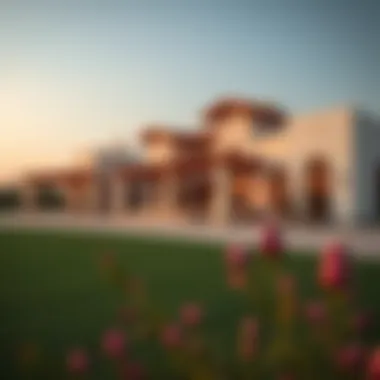
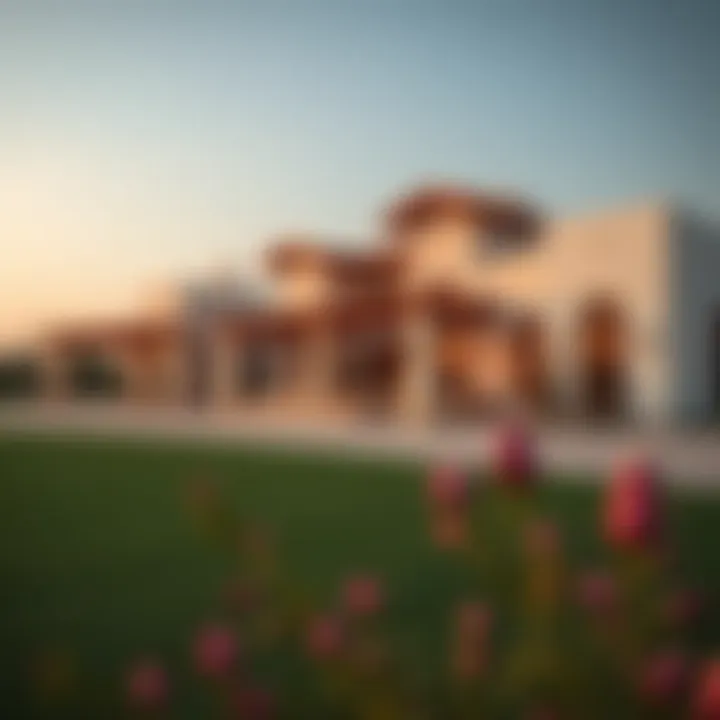
Outdoor amenities are a fundamental characteristic of UAE farmhouses. These spaces—be it a swimming pool, barbecue area, or shaded seating—transform these properties into idyllic retreats. Their significance lies in enhancing the lifestyle of residents, creating ideal locations for entertaining guests or simply relishing the sunset.
One unique feature of outdoor amenities is the use of shaded pergolas or cabanas, which not only offer reprieve from the sun but also serve as social spaces. The drawback might be the ongoing maintenance required to keep these amenities in top condition, especially in the harsh climate.
Gardens and Farms
Gardens and farms play a vital role in the essence of farmhouses, providing a connection to the earth. Incorporating these spaces into the overall design emphasizes self-sufficiency and sustainability. One key characteristic is the assortment of native plants and crops tailored to the region's climate, promoting biodiversity. This element is particularly appealing, as it allows residents to cultivate their own food.
A unique feature of these gardens could be the implementation of vertical farming or hydroponic systems, which optimize space and conserve water. However, the challenges of pest management and environmental conditions can hamper successful gardening efforts if not adequately addressed.
Each characteristic discussed not only defines the essence of UAE farmhouses but also contributes to their growing popularity amongst homebuyers. As we move forward in this exploration, it becomes clear that understanding these nuances is key to appreciating the full value of farmhouse living in the UAE.
Investment Appeal of Farmhouses
The increasing interest in farmhouses throughout the UAE signifies a notable shift in real estate investing. This section digs into what makes these properties so appealing to investors, particularly as lifestyle changes and market dynamics evolve. Farmhouses are no longer solely associated with agricultural ventures but have transitioned into lucrative retreats for both residents and expats seeking a more tranquil lifestyle.
Rising Demand
Changing Lifestyle Preferences
As more people reassess their living situations, changing lifestyle preferences come into sharper focus. Residents in urban centers, faced with busy lives and towering skyscrapers, are often on the lookout for peace and quiet, prompting them to consider farmhouses. That’s like trading in a crowded subway for a serene stroll through the fields. This desire for space, fresh air, and outdoor living is not only about aesthetics; it’s increasingly tied to well-being.
Key characteristics of this shift include a growing emphasis on family-centric living spaces that encourage activities and gatherings. As families seek property offerings that blend comfort and nature, they find that UAEs farmhouses provide just that. The unique feature of these homes often includes wide open spaces, which grant room for gardens, pets, and a playground for children—all advantages over cramped apartments. However, the downside could be the distance from urban amenities, which is something potential buyers must weigh carefully.
Escape from Urban Life
The notion of an escape from urban life is becoming more popular. Many individuals and families are seeking a refuge from the relentless pace of city living. Farmhouses provide them with an opportunity to hit the reset button. It’s about reclaiming a lifestyle that favors tranquility over the hustle and bustle.
The key characteristic here is the call for a simpler existence, a place where one can unwind and enjoy nature while still staying connected to city conveniences. The unique features like community-driven spaces, a sense of belonging, and access to local produce enhance the allure of this lifestyle choice. But it’s not all sunshine; the potential drawback might be missing out on urban conveniences, which some might find difficult to adapt to.
Market Trends
Price Evolution
In recent times, the landscape of farmhouse pricing has undergone a crucial evolution. Affordable luxury no longer seems like a distant dream, especially in certain areas of the UAE. As more buyers eye these properties, prices are beginning to reflect not just market demand but the inherent value of space and lifestyle.
This evolution is important because it reveals the increasing willingness of buyers to invest in these homes. The unique feature here is that as prices rise, they might also encourage further development, leading to a balanced growth that could stabilize the market. Naturally, the advantages include appreciating property values, while potential disadvantages could arise from overvaluation if the demand does not keep pace with rising prices.
Rental Potential
Another appealing aspect of investing in farmhouses is the rental potential they offer. With the trend toward rural living and well-being, many see these properties as valuable assets for generating rental income. In rural areas, attracting renters can often be easier, as people seek weekend getaways.
A notable characteristic of this potential is the adaptability of farmhouse space, giving owners the capability to host various types of guests—from families wanting a weekend away to digital nomads looking for longer stays. Specific elements include unique marketing opportunities that can captivate diverse demographics. However, it's essential to tread carefully; owners must be proactive about maintaining the property and navigating safety regulations to truly maximize this income potential.
"Investing in farmhouses isn't merely a financial decision; it's about embracing a lifestyle that redefines comfort and well-being."
In summary, the investment appeal of farmhouses in the UAE stems from the growing demand driven by lifestyle changes, emerging market trends, and the unique economic opportunities they present. As urban dwellers shift gears and seek refuge in rural settings, understanding these factors becomes crucial for anyone contemplating an investment in this vibrant segment.
Legal Considerations in Purchasing Farmhouses
When it comes to the world of farmhouses in the UAE, understanding the legal considerations is indispensable. Navigating the legal landscape ensures that potential buyers can make informed decisions, and more importantly, avoid pitfalls that might arise during the purchasing process. Every real estate investor, whether a local or an expatriate, should be acutely aware of the legal frameworks governing property ownership, documentation processes, and associated regulations. These elements not only safeguard investments but also enhance one's experience when acquiring rural properties.
Regulatory Framework
Laws Governing Property Ownership
In the UAE, the laws concerning property ownership are primarily framed by the Federal Law No. 28 of 2008, which regulates the ownership and management of properties. This law allows expatriates to own properties in specific areas, known as freehold zones, providing a level of security for their investments. This law's most notable feature is its clear demarcation of what foreign individuals can own, effectively broadening the market for farmhouses by making them attractive to non-nationals.
However, potential buyers must also recognize some limitations. Owning a farmhouse in a freehold area can sometimes lead to complications regarding rental rights or resale, which may not be as straightforward compared to other types of property, thus making it critical to understand these implications before diving in.
Zoning Regulations
Zoning regulations also play an essential role in the establishment of farmhouses across the UAE. Each emirate has zoning laws that dictate how land can be used, which affects the ease and legality of farmhouse construction and functionality. For instance, in certain areas, agricultural activities are strictly defined, and compliance with these regulations can lead to successful farming ventures.
An important aspect to consider is that zoning often comes with specific land-use categories. This means knowing whether a piece of land is designated for agricultural, residential, or mixed-use purposes can inform potential buyers about their options and liabilities. Understanding these factors can ultimately lead to a more profitable investment, as adherence to zoning regulations can enhance property value.
Documentation Process
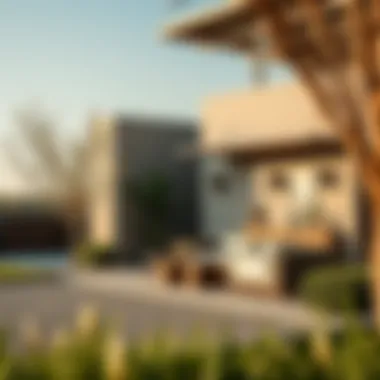
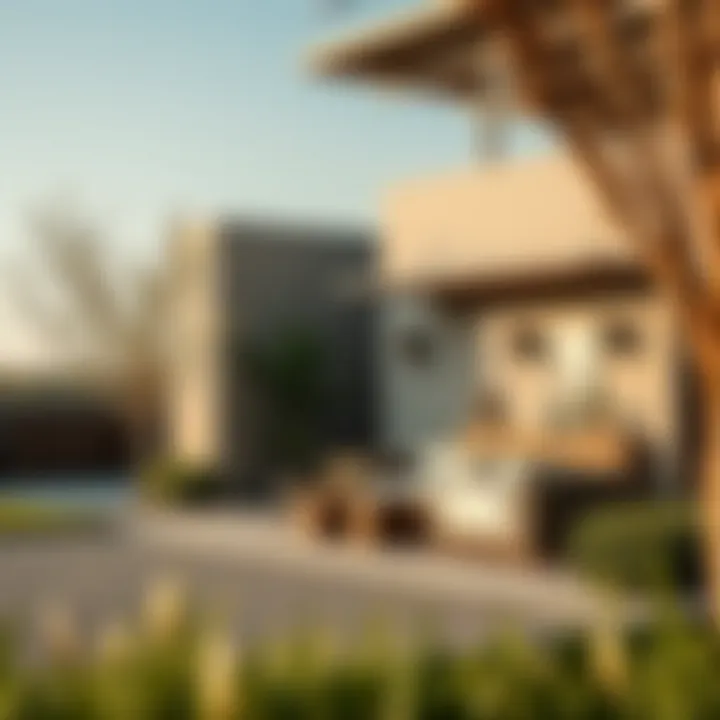
Required Paperwork
The acquisition of farmhouses also entails a thorough understanding of the required paperwork. A buyer must gather essential documents such as proof of identity, residence visas, and potentially, No Objection Certificates (NOCs) from relevant authorities. This process is vital, as having the correct documents reduces delays and legal issues down the line.
A key characteristic of this paperwork is that it's not just a mere formality; it serves as proof of legitimacy regarding ownership and financial capability. Completing this paperwork efficiently showcases the buyer's readiness in the market and reinforces a positive reputation. Not having the right documents can invite complications, leading to costly delays or, worse, legal disputes.
Due Diligence Steps
Lastly, the due diligence steps before making a purchase are essential for making informed decisions. This involves conducting comprehensive background checks on the property's ownership history, verifying land title authenticity, and even assessing the environmental conditions.
Due diligence serves as a safeguard against unforeseen issues. Investing the time and effort into proper due diligence can lead to advantageous outcomes and perhaps uncover hidden gems in the property listings. It’s not just about checking boxes; it's about securing peace of mind in what could be a significant financial commitment.
Prominent Regions for Farmhouse Development
Farmhouses in the UAE are not merely trends but represent a shift in how people are viewing rural life in a nation famed for its cutting-edge urban developments. Understanding the regions where these farmhouses are prevalent is essential. Each region offers distinct characteristics and benefits that cater to diverse lifestyles and investor interests.
Both Dubai and Abu Dhabi host unique landscapes suited for farmhouse development, presenting a mix of scenic beauty, proximity to urban conveniences, and a calmer pace of life. Potential buyers and investors will find various offerings in rural developments and agricultural zones that highlight the advantages of choosing a farmhouse lifestyle.
Dubai’s Countryside
Rural Developments
Rural developments around Dubai are catching the eye of many looking for a retreat from the bustling city life. Spacious landscapes, dotted with charming farmhouses, provide a natural escape. One of the most significant aspects of these developments is their design philosophy, which often retains traditional Emirati motifs while embracing modern architecture.
This blend makes them not just residences but also reflections of cultural identity, infusing warmth and personality into the region. A standout characteristic of these rural developments is the inclusion of community-focused amenities. Think shared gardens and recreational areas that foster a sense of belonging. However, folks should be aware that while these properties offer tranquility, access to essential services might sometimes require a bit more planning.
Agricultural Zones
In contrast to urban hubs, agricultural zones in Dubai present another facet of farmhouse living. These zones are deliberately structured to enhance agricultural practices while also serving as residential spaces for those immersed in this lifestyle. The hallmark of agricultural zones is their fertile lands and potential for self-sufficiency, appealing to environmentally conscious buyers.
These zones facilitate a thriving community of farmers and residents who value sustainability. One unique feature here is the concept of growing your own produce, which blends leisure with a practical skill. However, investing in agricultural zones demands a deeper understanding of market fluctuations and farming needs, making it both an adventurous and risk-laden endeavor.
Abu Dhabi’s Scenic Spaces
Exclusive Estates
Moving a bit west, Abu Dhabi showcases exclusive estates that redefine luxury farmhouse living. These estates are characterized by grand spaces and high-end finishes, appealing to individuals seeking opulence amid natural surroundings. Exclusive estates often boast amenities like private pools, expansive gardens, and even stables for equestrian enthusiasts.
What sets these estates apart is the privacy they afford, enabling residents to enjoy a peaceful lifestyle without the hustle of everyday urban life. However, prospective buyers should note that with luxury comes a hefty price tag. Buyers must weigh the benefits of exclusivity against the substantial financial investment required.
Waterfront Properties
Lastly, waterfront properties stand out as a prime choice for those enchanted by the allure of serene views and the sounds of nature. These properties often offer direct access to pristine waters, making them perfect for water-based recreation. A key characteristic of waterfront farmhouses is their architectural design, often crafted to maximize views, allowing residents to soak in every bit of the beautiful landscape.
The investment in waterfront properties can be quite lucrative, given their desirability in both the rental and resale markets. That being said, potential buyers may face challenges such as stricter regulations regarding construction and preservation of coastal environments. Balancing aesthetic desires with environmental concerns is crucial for anyone looking into these stunning properties.
"Farmhouses in the UAE symbolize more than just a place to live; they embody a lifestyle choice that embraces nature, community, and sustainability."
Each of these regions enhances the overall concept of farmhouses in the UAE, making them not just desirable living spaces but also smart investments in a rapidly evolving market. Familiarity with local specifics gives buyers an upper hand, ensuring they choose a property that aligns perfectly with their expectations and lifestyle desires.
Design Elements of Farmhouses
Design elements are the backbone of farmhouse aesthetics and functionality. In the UAE, these elements blend traditional approaches with modern influences, creating a unique atmosphere. They not only reflect personal tastes but also highlight local culture and adapt to the environmental context. Exploring sustainable and aesthetic features helps potential buyers and investors understand their value.
Sustainability Features
Eco-Friendly Materials
When it comes to eco-friendly materials, one can see a noticeable shift in preferences among buyers. These materials are not just buzzwords—they're a commitment to sustainability. For instance, materials like bamboo and recycled wood are becoming popular due to their renewability and aesthetic appeal. Using these materials not only reduces carbon footprints but also promotes a healthier living environment.
The unique feature of eco-friendly materials is their lightweight nature and durability, enabling structures to withstand desert conditions while also providing a warm, inviting ambiance indoors. However, sourcing these materials can sometimes be an uphill battle in the UAE, where traditional construction methods tend to dominate. Yet, the long-term savings and environmental benefits make them a worthy investment.
Water Conservation Techniques
Water conservation is vital in this arid region, and innovative techniques must be incorporated in farmhouse designs. Many property developers are now adopting smart irrigation systems and rainwater harvesting methods. The key characteristic of these systems is their ability to significantly decrease water wastage, which is crucial in a water-scarce environment like the UAE.
One unique aspect of these water conservation techniques includes the use of permeable pavements that allow rainwater to filter through, replenishing ground reserves. While the initial setup costs may be high, the subsequent savings in utility bills and the positive environmental impact create a strong case for their use in UAE farmhouses.
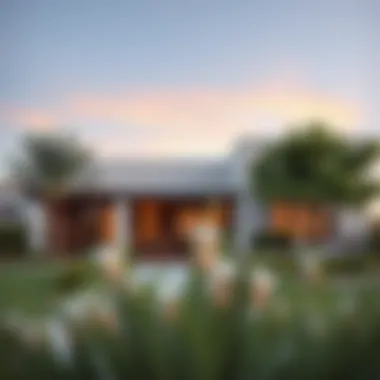
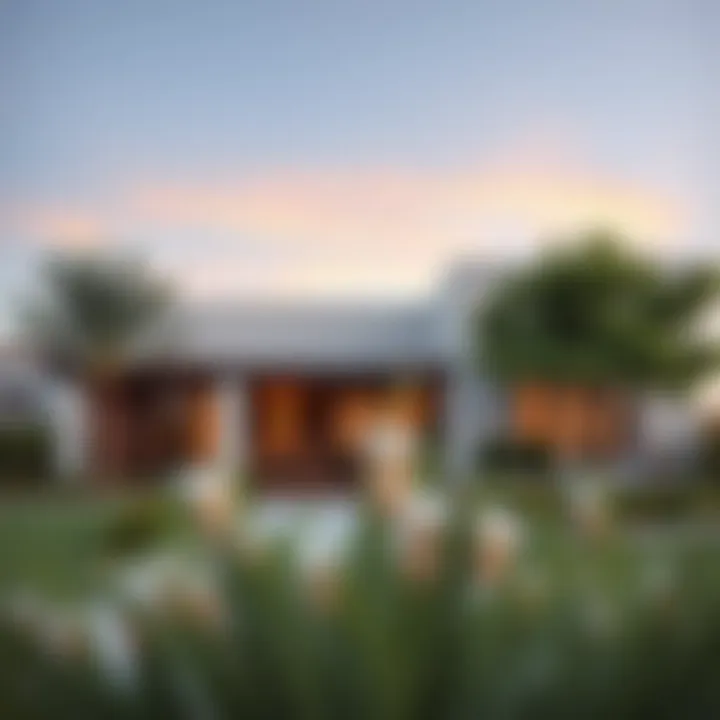
Aesthetic Considerations
Aesthetic considerations play a fundamental role in determining how attractive a farmhouse appears to potential buyers. The blend of traditional and modern styles can create a captivating environment that appeals to diverse tastes.
Traditional Decor
Delving into traditional decor, it’s clear that it adds an irreplaceable charm to UAE farmhouses. Items such as intricate mashrabiya panels and traditional Arabian rugs bring a sense of heritage, grounding modern living in the region's rich past. This decor not only enhances aesthetic value but also promotes cultural identity.
One key characteristic is the craftsmanship involved in these decor elements. Handcrafted items often tell stories of artisanship that resonate with buyers seeking a connection to local culture. However, a potential downside is that maintaining these traditional elements can require more effort compared to their modern counterparts, which generally offer ease of upkeep.
Modern Furnishings
Modern furnishings represent a bold choice for many farmhouse owners, appealing especially to younger families and expatriates. Sleek lines and minimalistic designs create a spacious feel, making the home appear larger and more open. This aspect aligns seamlessly with contemporary tastes that prioritize simplicity and functionality.
The beauty of opting for modern furnishings is their versatility. They can easily adapt to changing trends and personal preferences. However, they might sometimes lack the warmth that traditional decor offers, which can lead to a less inviting atmosphere. Nevertheless, savvy buyers can strike a balance, curating spaces that embody both comfort and modernity.
Challenges in the Farmhouse Market
The farmhouse market in the UAE is quickly evolving but it doesn't come without its headaches. Understanding the challenges faced can give investors, buyers, and developers a clear advantage. As appealing as the prospect of owning or investing in a farmhouse might be, various potential hurdles lurk in the shadows, requiring careful consideration.
Market Saturation Risks
One of the looming challenges in this sector is the risk of market saturation. With more and more people looking to purchase farmhouses, the supply may threaten to outpace demand, thereby driving down property values. When too many similar properties flood the market, it can create a situation where buyers have too many choices and sellers are forced to lower prices to stand out. Investors need to decisively evaluate the landscape and identify which regions currently exhibit a healthy balance of supply and demand.
Another nuance is that as the trend picks up traction, sharper competition might come from developers who want to ride the coattails of the rustic living style's popularity. A potential gold rush into farmhouse developments could spell trouble for current property owners, who may witness their once-valuable assets depreciate under new listings.
Environmental Concerns
With the rise of farmhouses, there comes greater scrutiny on environmental impacts. The construction and maintenance of these properties can considerably affect local ecosystems, altering habitats, and disrupting the natural balance within their surroundings. Such events could lead to adverse effects that are not only harmful but also counterintuitive to the very essence of farm life.
Impact on Local Ecosystems
Building farmhouses can change the lay of the land in ways that may not be immediately apparent. Even if a farmhouse is designed to be environmentally friendly, the process of clearing land to create these spaces can harm fauna and flora. Such alterations also risk diminishing biodiversity in the area. A key characteristic here is the delicate interplay between agriculture and nature. An alarming rate of species loss can surface when farmland expands into previously untouched areas. This poses a significant dilemma for developers aiming for eco-conscious designs while grappling with potential ecological consequences.
Sustainable Farming Practices
On the flip side, adopting sustainable farming practices can address some of these environmental concerns. This approach balances the ambitions of the farmhouse sector with the need to maintain ecological integrity. For instance, crop rotation and organic farming methods can promote soil health and minimize chemical runoff.
Utilizing renewable resources for household energy needs and implementing water conservation techniques can also show a commitment to environmental stewardship. The unique feature here is that sustainable practices not only appeal to environmentally-conscious buyers but can often lead to cost savings in the long run. While the initial investment may be higher, the long-term benefits can far outweigh those early outlays, making it a smart choice for many looking into farmhouses in the UAE.
Ultimately, navigating these challenges requires a keen sense of foresight, understanding market dynamics, and an unwavering commitment to balance development with environmental awareness.
Future Outlook for the Farmhouse Sector
The future outlook for the farmhouse sector in the UAE is not merely a matter of interest—it's an essential framework shaping how communities envision sustainable living. As urban areas continue expanding, there's a burgeoning interest in rural properties that provide a respite from the daily grind. This section considers the predicted trends and innovations that are driving this shift, exploring how the incorporation of thoughtful designs and smart technology responds to both market demand and environmental concerns.
Predicted Trends
Increasing Demand for Rural Living
The growing inclination toward rural living is increasingly becoming a focal point in the UAE's real estate landscape. Many residents now view farmhouse ownership not just as a luxury, but as a strategic lifestyle choice that promises a slower pace, coupled with more space and a connection to nature. One key characteristic of this trend is the desire for a healthier, more tranquil way of life—far removed from bustling city centers.
The unique feature here is the creation of spaces that blend comfort and nature, allowing for personal cultivation of gardens and sustainable practices like organic farming. This transition comes with notable advantages, including improved mental well-being and a sense of community for families seeking a nurturing environment. However, challenges do exist, such as potential isolation and the upkeep of larger lands, which may deter some buyers.
Investment Opportunities
Investment in farmhouses is catching the attention of savvy buyers in the UAE, presenting a dynamic aspect of the current market. With numerous buyers recognizing the potential for generating income from these properties, the appeal of this niche market is rising. The key characteristic of this opportunity lies in the ability to tap into a dual income stream—residential comfort combined with potential renting or hosting agricultural tourism.
A unique feature of these investment opportunities is the flexible use of property for both leisure and profit, which many find appealing during uncertain economic times. However, it’s important to carefully consider the advantages of diverse sources of income against the disadvantages of market fluctuations and the commitment required in property management.
Innovations in Farmhouse Design
Smart Home Features
Smart home features are becoming more commonplace in farmhouses. These technological advancements contribute significantly to enhancing everyday living. Integrating elements such as automated lighting and climate control not only increases convenience but also promotes energy efficiency. One beneficial aspect of these features is the potential for homeowners to monitor and manage energy usage effectively, which aligns well with the sustainability goals prevalent in today's society.
The challenge, however, lies in the initial costs and the technical know-how required to manage these systems effectively. Homeowners must weigh these factors against the long-term benefits of modern living.
Integration of Technology and Nature
Integrating technology with natural elements represents a compelling narrative in the evolution of farmhouse designs. This approach allows homeowners to enjoy state-of-the-art amenities while remaining connected to their environment. Crucial characteristics include the utilization of renewable energy sources, like solar panels, alongside the preservation of green spaces. This design method promotes sustainable living, directly addressing concerns about environmental impact.
The advantage of this innovative dialogue between tech and nature creates homes that are efficient and environmentally responsible. Conversely, the disadvantages may involve additional initial investments to ensure that technologies are not just smart, but also harmoniously integrated into the surrounding landscape.
The future of farmhouses in the UAE is not just about a retreat from city life; it’s about forging a lifestyle that harmonizes comfort, community, and environment.







